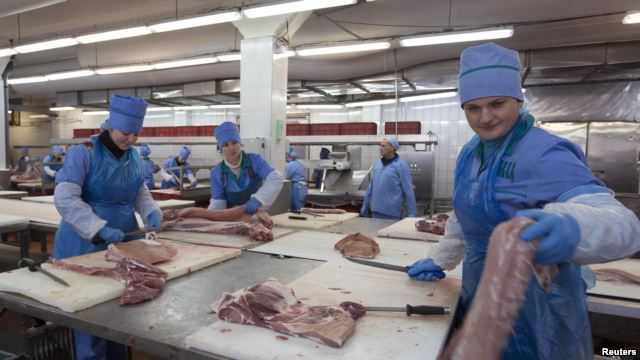
Belarus and Russia’s Ailing Economy
Publication: Eurasia Daily Monitor Volume: 11 Issue: 220
By:

The conflict that arose after Russia’s temporary ban on imports from 23 Belarusian meat processors and on Belarusian food transit to Kazakhstan (see EDM, December 3) has not been resolved yet. During the first week of December, Belarusian officials at all levels of government expressed indignation; Russian high-level officials kept mum but allowed various media outlets they control to speak for Moscow. Only Georgy Bovt, a veteran of Izvestia, now writing for Gazeta.ru, broke ranks by effectively suggesting that President Alyaksandr Lukashenka’s rage over the Russian ban was justified. Although import of the banned food products from the European Union through the country of Belarus has indeed increased, it is not worth undermining the Russia-Belarus-Kazakhstan Custom Union and restoring the border controls, the Gazeta.ru journalist argued. Bovt reminded his readers that Rosselkhozkontrol, the Russian food control administration, has a history of being used as a weapon in Russia’s wars with Georgia and Moldova. However, the same tactic is unfit when it comes to Russia’s closest allies. It is high time to drop the imperial attitude because “a neglect of the new realities and a big brother complex have already ‘helped’ us [Russia] to lose several post-Soviet countries, including Ukraine,” concluded Bovt (Gazeta.ru, December 1).
On December 3, the first channel of Belarusian TV broadcast a documentary about the trade war. The program presented three major theses: First, by banning food imports and rail transit, Russia violates certain mutually agreed clauses of the Custom Union agreement. Second, the entire conflict has been organized by the Russian “food mafia” interested in raising food prices. Third, multiple attempts to smuggle non-food products from Russia to Belarus have been thwarted by the Belarusian agencies, but all problems were resolved behind the scenes. Russia, however, has decided to act differently (Belgosteleradio, December 4).
The bilateral trade dispute resulted from the illegal lobbying of some corporate interests, according to Anatoly Rubinov, who chairs the Council of the Republic, the upper chamber of the Belarusian parliament. Echoing Lukashenka’s December 3 speech (Belarus Segodnya, December 4), Rubinov calls laughable the claim that Belarusian food items are of lower quality than similar foods produced in Russia. Rubinov also used a geopolitical argument to raise Belarus’s bargaining power vis-à-vis Russia. According to this argument, Belarus (which was targeted by Western sanction well before Russia) was actually singled out as the western outpost of the Union State and of the Eurasian Union because the West is leery of any reintegration efforts within the post-Soviet space. If this is the case, Minsk and Moscow have to pursue tighter unity, and in this light, sparking artificial conflicts by special interests is akin to sabotage (Belarus Segodnya, December 6).
The trade war over food exports and transit is not the only recent economic snag between Russia and Belarus. Indeed, due to the fact that since the beginning of the year, the Russian ruble lost 60 percent of its value whereas the Belarusian ruble dropped by only 14 percent, Belarusian exports to Russia are becoming more expensive for Russian buyers. As a result, Belarus either needs a loan to bide its time until the Russian ruble comes back, or it will need to devalue its own currency (Belorusskie Novosti, December 6). For now, Belarusians are “storming” Russian car dealerships in an effort to buy cars that are currently priced 30-to-50 percent lower, when calculated in US dollars, than at Belarusian dealerships. On a daily basis, 500 new cars bought in Russia are being registered in Belarus, and their average price is between $20,000 and $25,000. According to a Russian source, up to 50 percent of all new and used cars currently bought in Russia are actually bought by citizens of Belarus—quite a phenomenon considering the relatively small size of Belarus’s internal market (Gazeta.ru, December 5).
Also, due to the Russian ruble’s drastic devaluation, Belarusians for the first time are becoming wealthier than Russians. For example, in September, the average retirement pension in Russia was 10,900 Russian rubles per month. When several weeks ago $1 was worth 36 rubles, the average Russian monthly pension was worth $300, but at 54 rubles for $1 it is merely $200. In Belarus, in November, the average monthly pension was 2,064,000 Belarusian rubles or $250. Likewise, the average monthly wage in Belarus ($590) has approached the upper threshold for the modal (or most widespread) wage in Russia. Formally, Russia’s average wage is 33,000 rubles; but because of extreme social polarization, this high indicator is a result of a few people earning an extremely high income; whereas more than half of Russians make below $20,000 rubles a month. This is $610 now, just slightly above the average monthly wage in Belarus, a country where social polarization is modest and therefore the average is more indicative of the actual situation for many. Should the devaluation of the Russian ruble continue, most Belarusians will become wealthier than the majority of Russians—an entirely new phenomenon (Svaboda, December 5).
Vital Tzyhankow, a Minsk-based analyst of the Belarusian service of Radio Liberty, suggests three implications for this trend. First, currently, the Belarusian folk wisdom about Russia can be encapsulated as “yes, they make more money than us, but we have better roads, our life is more orderly and we have no oligarchs.” But as the sole element of Russia’s perceived advantage disappears, Belarusians’ attachment to Russia may wane. Second, the flow of guest workers from Belarus to Russia will wane as well. Third, the “economic egoism” of Russian authorities will receive a boost. Finally, due to a more drastic devaluation of the Russian ruble, it may eventually be Belarus that will have to fight illegal export from Russia, not the other way around; so the current trade war may be a harbinger of worse things to come. If these implications materialize, the general backdrop of the new presidential campaign is going to deviate from bland predictions. The elements of that backdrop may be anti-Russian rhetoric by Minsk, trade wars, a worsening of the economic situation, increased social tensions, and the spread of negative views on Russia (Svaboda, December 5). Quite possibly, Russia-Belarus relations are entering uncharted waters.




